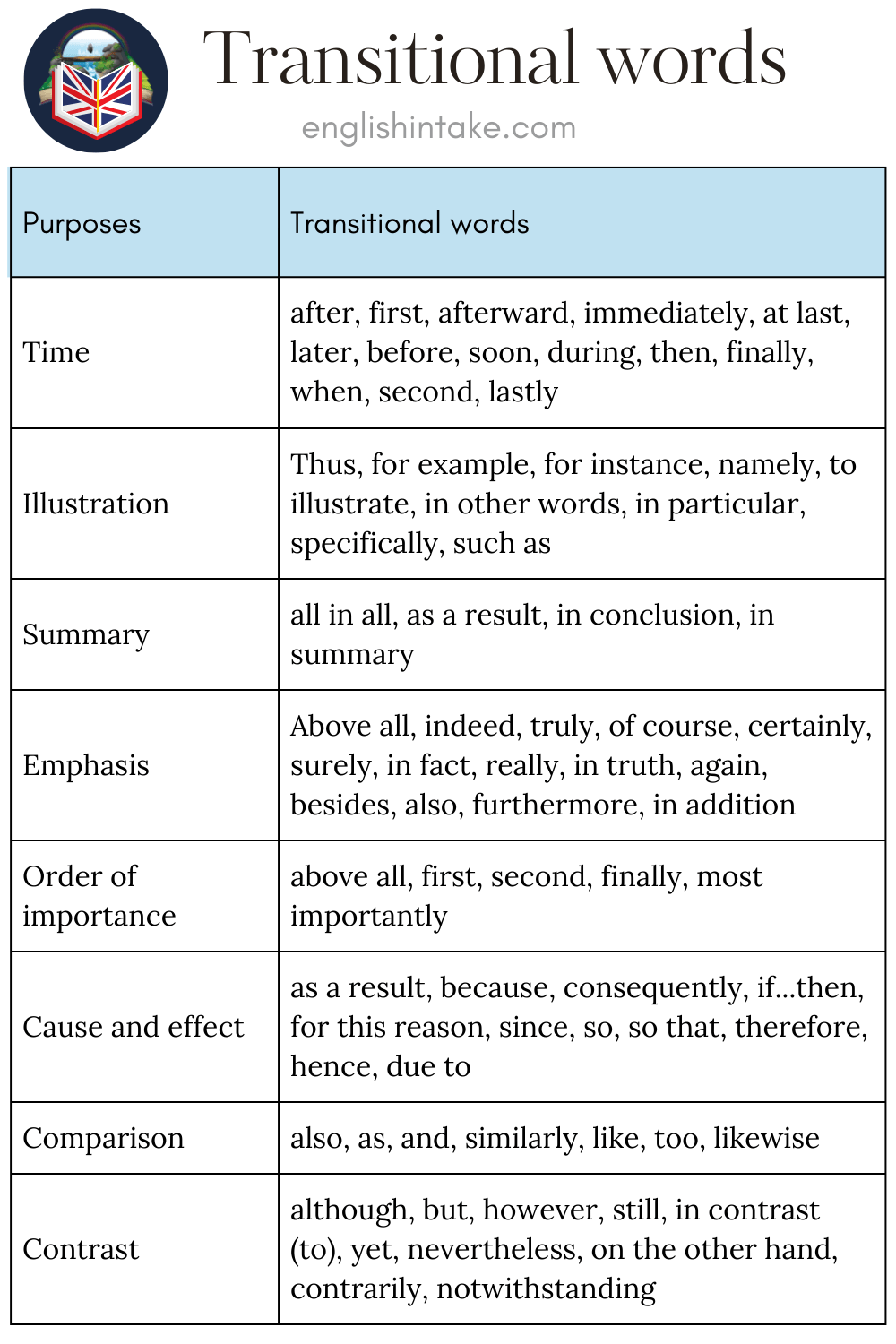1. What are linking words?
Linking words, also known as connectors or transition words, are words that help make connections between ideas or sentences. Understanding how to use them is crucial to make our sentences easy to follow. In English, there are various phrases you can use to improve your writing flow. We will look at each of them in detail using practical examples.
2. List of linking words
| Consequence | Contrast | Addition | Time | Example | Summary | Cause | Comparison |
|---|---|---|---|---|---|---|---|
| As a consequence (of) | Although | Additionally | After | For example | In conclusion |
Because (of) |
Similarly |
| As a result | But | Also | Before | For instance | In summary | Due to | Likewise |
| Consequently | Despite | Furthermore | During | Namely | To sum up | Since | In the same way |
| Hence | However | Moreover | Meanwhile | Such as | Overall | As | Compared to/with |
| Therefore | In contrast | Plus | Subsequently | In brief | Comparable | ||
| Thus | On the contrary | In addition | Until | Same as | |||
| So | Nevertheless | What’s more | As soon as | As...as | |||
| Whereas | Besides | Once | Like | ||||
| And |
3. Different types of linking words
There are many types of linking or transition words in English. Let's loook at them one by one.
3.1 Consequence
To show the result or outcome of a situation, we can use consequently, as a result, hence, therefore, and thus. They help connect two parts of a sentence or two sentences to clarify that what is stated in the second part is a direct result of what is mentioned in the first part.
- Air quality in the city has deteriorated as a consequence of increased traffic congestion.
- His dad just passed away, hence his sadness.
- She forgot to set his alarm; therefore, he was late for the meeting.
- The teacher was sick; consequently, the class was cancelled.
- Thousands of protesters gathered on main street last Saturday. As a result, the road was blocked for hours.
- He forgot to set his alarm and thus missed his flight.
- It was too hot, so we stayed indoors.
3.2 Contrast
To express how different things are, we can use but, however, on the other hand, in contrast, and although. They connect ideas or sentences to introduce that something is different from what was said before.
- She bought the expensive dress, although she was trying to save money.
- She managed to finish the marathon despite her injury.
- The team worked hard; however, they lost the game.
- Summer days are long and sunny; in contrast, winter days are short and often cloudy.
- Many thought the new law would decrease the crime rate in the city; on the contrary, it has risen.
- The startup had very little funding. Nevertheless, it became profitable within its first year.
- I like to go to bed early, whereas my roommate stays up late.
3.3 Addition
To add more information, we use in addition, what’s more, additionally, besides, furthermore, not only....(but) also, too, or and.
- She is a lawyer in addition to being a pastor.
- She’s an excellent singer. Moreover, she plays the guitar beautifully.
- Not only did he lost his keys, but also his wallet.
- The cake tasted delicious, and what’s more, it was homemade.
- The community project was a huge success; additionally, it brought the neighbourhood closer together.
- Are you studying any other languages besides English?
- Have you read that book too?
- I love watching movies and playing video games.
3.4 Time
When we talk or write about events, we use connecting words of time to show the order in which things happen or how events are related to each other over time.
- After we finish dinner, we can watch a movie.
- I’ll call you as soon as I arrive home.
- Before we go to the park, we need to clean the house.
- We started feeling tired by the time the concert ended.
- Once you complete your homework, you can play video games.
- We are waiting for the rest of the guests to arrive. Meanwhile, you could enjoy some refreshments at the bar.
- Let’s wait until midnight before we light the fireworks.
- We’ll leave after lunch.
- The restaurant received poor reviews for its service and subsequently closed down within a year.
3.5 Example
When we talk or write, we often need to explain things more clearly by showing examples. To do this, we use connectors introduce examples.
- Smartphone, for instance, has changed the way we communicate.
- Many fruits are rich in vitamins. For example, oranges and strawberries are excellent sources of Vitamin C.
- The club offers various activities for its members, such as swimming, tennis, and yoga classes.
- We must enhance the quality of public transportation in the cities where it’s crucial, namely in densely populated urban areas.
3.6 Summary
When we finish talking or writing about something, we often use connecting words to summarise our points. They signal that we are about to give a quick overview or the main points of what we’ve discussed.
- Overall, the project was a success.
- In summary, his book provides practical advice to achieve personal growth.
- To sum up, our top priority is to increase sales by 50%.
- In brief, he was lying.
- In conclusion, we need to change our marketing strategy.
3.7 Cause
To explain why something happens, we can use transition words like because, so, and since. They can be used to join two independent clauses.
- We cancelled the meeting because Tom was sick.
- The concert was reported due to weather conditions.
- Since he did not reply to my message, I assumed he was busy.
3.8 Comparison
For comparison, we often use similarly, likewise, compared to/with, or in the same way.
- My brother is as tall as me.
- My wife is the same age as me.
- We adopted a recycling programme, and other local companies did likewise.
- He is less fearful compared to his brother.
- Our quality is comparable to that found in premium brands.
- My mom used to cook healthy meals for me. Similarly, I cook nutritious food for my kids.
- I volunteer at the local shelter on weekends, like my parents did.
- I treat my wife in the same way my dad did to my mom.


